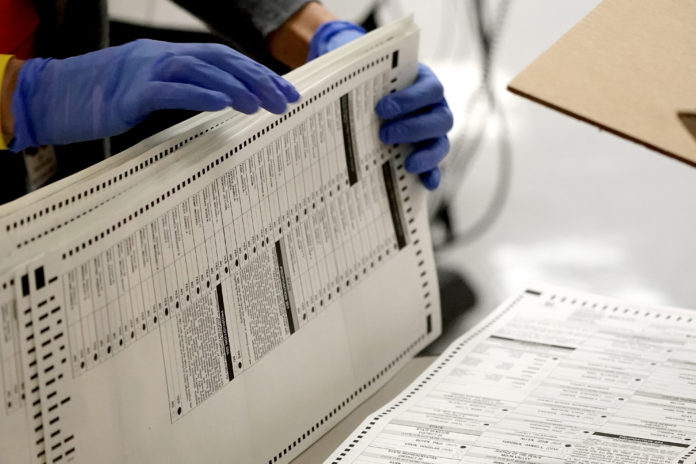
Arizona Republicans on Tuesday advanced an election bill that’s drawn fierce opposition from voting rights advocates, Democrats, and prominent business executives who say it would disenfranchise voters of color.
The measure passed the House in a party-line vote. It would purge inconsistent voters from the popular permanent early voting list and comes as Arizona becomes increasingly competitive and pivotal to control of the presidency and the U.S. Senate.
Voting rights are in the spotlight in Arizona, Georgia, Texas, and elsewhere as Republicans push legislation to reshape election procedures following former President Donald Trump’s defeat last year. Trump’s allies have aggressively pushed allegations that the election in Arizona was tainted by fraud, but no evidence supports the claim.
“Why are we afraid of our communities coming out to vote?” said Rep. Raquel Terán, a Phoenix Democrat who is also chair of the Arizona Democratic Party.
Democrats say the measure would disenfranchise voters who expect to get a ballot that never arrives, with an especially strong impact on people of color.
Republicans say the measure is necessary to limit the number of unvoted ballots in circulation, noting it would only affect voters who have shown disinterest in voting by mail.
“There can be hanky-panky with those ballots,” said Rep. John Kavanagh, a Republican from Fountain Hills. Neither he nor other supporters of the measure have pointed to instances of mail ballots being fraudulently voted.
It’s urgent to tighten election procedures to reassure the voters who distrust the election results, Republicans say.
Greater Phoenix Leadership, a business group, and more than 50 executives, including the owner of the Arizona Cardinals, urged lawmakers to reject the bill and others that they say would suppress voters.
Critics argue Arizona’s economy would be harmed if Arizona gets a reputation for voter suppression, pointing to the backlash by businesses to a Georgia voting law and the decision by Major League Baseball to pull the All-Star Game from Atlanta. Arizona is scheduled to host the 2023 Super Bowl and the 2024 Final Four.
Other Arizona election bills remain alive but in limbo, and it’s unclear if they’ll get enough support to advance. That includes a measure requiring voters to include a driver’s license or other ID number in order for their mail ballot to be counted.
“I just believe that it would be a lot more healthy for our state…if those constituents who were rooting for Donald Trump and wanted Donald Trump to be president actually dealt with their anger and disappointment in a less destructive and petulant way,” said Rep. Athena Salman, a Tempe Democrat.
The bill approved Tuesday prompted a tense debate in the House as Democrats objected to GOP Speaker Rusty Bowers’ decision to limit discussion and Republicans tried to prevent Democrats from saying the GOP intended to suppress votes from people of color.
The bill, SB1485, would remove people who don’t return their mail ballot for two consecutive election cycles from the permanent list, which allows voters to automatically receive a ballot before each election. About 75% of Arizona voters are on the list. Affected voters would get a postcard asking if they want to remain on the list and would be removed if they don’t respond within 90 days.
About 200,000 voters sat out the primary and general elections in 2018 and 2020 and would be eligible for removal, according to data from the secretary of state’s office.
It had been in limbo for several weeks while supporters negotiated minor changes to win support from at least one Republican holdout. The measure has already passed the Senate but must return for approval of the changes made in the House before going to Gov. Doug Ducey. Ducey, a Republican, has not said whether he’d sign it.
Republished with the permission of the Associated Press.













